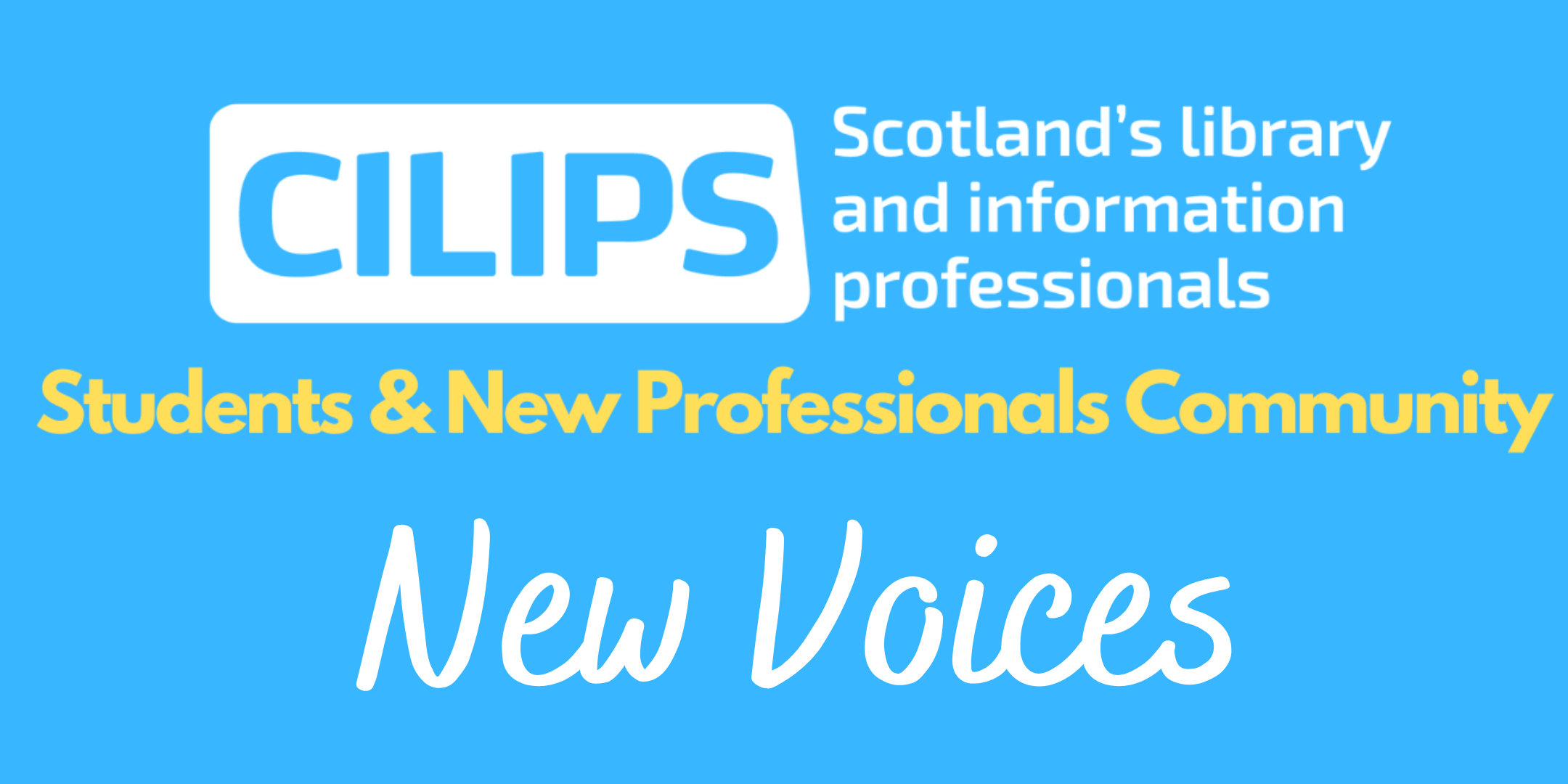New Voices RGU Student Series 2024 – Aurelio Patierno
Category: Blog, New Voices, RGU Student Series 2024

In the 2024 Student Series for the New Voices blog, CILIPS Students & New Professionals Community will be sharing the views of Robert Gordon University students from the MSc in Information and Library Studies.
With special thanks to Dr Konstantina Martzoukou, Teaching Excellence Fellow and Associate Professor, for organising these thought-provoking contributions.
Aurelio has a background in History of Art and Painting Conservation. He worked as an administrative assistant for the City of Rome Municipal Libraries and as a tourist guide before moving to London for an MA in Museum Studies. Aurelio volunteered at Tate Gallery Archive before progressing to the British Library as a Reference Specialist for Science. He is a part-time student in Information and Library Studies at RGU with a personal interest in Health Information.
What is the role of information professionals in supporting information literacy skills development for using generative artificial intelligence tools in finding reliable sources of health information?
Since their launch in late 2022, Generative Artificial Intelligence tools (such as Chat GPT or Google Bard) have been the focal topic of discussion in the Library sector because generative AI is used to get our hands on more diversified and tailored information. However, there are some concerns about the quality of the information provided.
Generative AI are models or algorithms capable of producing entirely new text, images, videos, code, data, or 3D renderings. They draw upon the extensive datasets they find online and use them in their training. However, they have one main issue: we do not know if the content they produce is accurate or where the information has been sourced (Ortiz 2023).
In light of this, can information professionals assist users in enhancing their information literacy skills, especially when sourcing health-related information from Generative Artificial Intelligence tools?
Information Literacy is described by The Chartered Institute of Library and Information Professionals (CILIP) as “the ability to think critically and make balanced judgements about any information we find and use”. It gives us skills to discover, access, interpret, analyse, manage, create, communicate, store and share information critically and ethically (CILIP 2018 p.3).
Furthermore, health information literacy plays a crucial role in enabling users to make informed decisions regarding health and well-being. It is essential to find trustworthy information sources for managing health conditions based on credible healthcare sources (CILIP 2018 p. 5).
Generative Artificial Intelligence tools are also gaining momentum in the healthcare sector, and more and more health professionals and patients have given it a try. These tools are used in many different ways: medical students may use the new technology to create essays or paragraphs, while it can assist medical professionals with assembling documents, systematic reviews or guidelines/policies drafts, generate search strategies or summarise complex topics when interacting with patients.
Nevertheless, there are limitations and risks when using this new technology for health-related research. Users must take precautions: medical students must analyse critically AI-generated content to prevent bias and misleading or wrong responses. As for medical professionals, AI tools lack human clinical reasoning, and professional judgment and supervision are crucial to avoid potential risks. Eventually, the technology will improve and deliver better performance to address the above issues, but it is still too early to say how and when (Woods 2023).
What can information professionals do to mitigate the issues highlighted above? Firstly, Information professionals should understand the ethical issues connected to the nature of the technology and develop new services and support for AI users (Cox 2022). Then, information professionals can play a leading role in offering opportunities to improve the information literacy of medical professionals and patients and in drawing guidance on using generative AI and introducing them in health libraries and within the community, where fundamental training can be delivered (Akakpo 2023).
HEE (Health Education England) and CILIP are currently going in this direction. They acknowledge that health literacy is crucial, and NHS knowledge specialists are playing an important role in promoting information literacy in healthcare, developing resources and e-learning. Together, they are developing new forms of training and education for librarians based on computational sense, data science, data literacy, AI and algorithmic literacy to benefit library and AI users (Lacey Bryant 2022).
To summarise
– Generative AI tools are a new and still developing technology.
– They offer many advantages and can simplify information research, but the nature and accuracy of the content provided cannot be verified.
– Information professionals can play a prominent role in mitigating the issues produced by generative AI tools for the benefit of users, but new types of training for both librarians and users are necessary.
Bibliography
AKAKPO, G. M. 2023. Skilled for the Future: Information Literacy for AI Use by University Students in Africa and the Role of Librarians. Internet Reference Services Quarterly.
CILIP 2018. ILG launch new CILIP information literacy definition. [online]. London: CILIP. Available from: https://infolit.org.uk/new-il-definition/ [Accessed 30 October 2023].
COX, A. 2022. The Ethics of AI for Information Professionals: Eight Scenarios. Journal of the Australian Library and Information Association, 71(3), pp. 201-214.
COX, A. 2023. How artificial intelligence might change academic library work: Applying the competencies literature and the theory of the professions. Journal of the Association for Information Science and Technology, 74(3), pp. 367–380.
HOUSTON A. B., CORRADO E. M. 2023. Embracing ChatGPT: Implications of Emergent Language Models for Academia and Libraries. Technical Services Quarterly, 40(2), pp. 76-91.
LACEY BRYANT, S., BRIDGEN, R., HOPKINS, E., MCLAREN, C., STEWART, D. 2022. NHS knowledge and library services in England in the digital age. Health Information & Libraries Journal, 39(4), pp. 385–391.
ORTIZ, S. 2023. What is generative AI and why is it so popular? Here’s everything you need to know. [online]. Available from: https://www.zdnet.com/article/what-isgenerative-ai-and-why-is-it-so-popular-heres-everything-you-need-to-know [Accessed 30 October 2023].
WOOD, H. 2023. How are healthcare professionals using generative AI. [online].
NHS Health Education England. Available from: https://library.hee.nhs.uk/hannah-woodhow-are-healthcare-professionals-using-generative-ai [Accessed 30 October 2023]